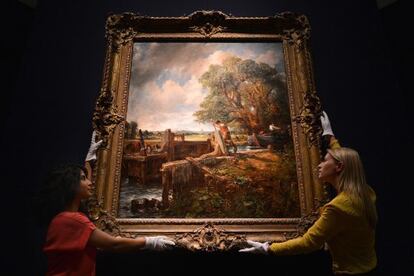Carmen gets her cash
Baroness Thyssen banks 25 million euros after the controversial sale of her Constable masterpiece ‘The Lock’ in London

Carmen Thyssen now has the cash injection she said she needed to ride out the economic crisis. British landscape painter John Constable’s masterpiece The Lock (1824) — without doubt one of the most important pieces in the baroness’ collection — was sold for a round 20 million pounds (24.8 million euros) at auction in Christie’s in London on Tuesday night to an anonymous telephone buyer.
The Lock, which had a starting price of 17 million pounds (21 million euros), formed part of a lot of big-name artists that also featured works by Rembrandt, Brueghel, Picasso and Francis Bacon.
The sale has caused a lot of upset in Spain. The canvas was acquired by her late husband, Baron Thyssen-Bornemisza, in an auction at Sotheby’s on November 14, 1990, for 10.78 million pounds (almost 13 million euros) — the biggest amount ever paid for a Constable painting at the time. Tuesday’s sale of the work, the last great landscape by the British artist still in private hands, leaves an irreplaceable hole in the Carmen Thyssen collection.
The collection, which consists of around 700 paintings from the 18th to the 20th century, has been on loan to the Spanish state for the last 12 years with a long-term agreement to guarantee its continuity in the Thyssen-Bornemisza Museum still pending. It is presently on show on the first and second floors of the museum, alongside her husband’s collection, which comprises around 1,000 pieces acquired by the Spanish state in 1993 for 350 million dollars. Experts value the baroness’ collection at around 800 million euros. Around 50 of its works have been classified as masterpieces.
Although the state has neither bought nor paid rent to the baroness, it has met the costs of constructing a wing of the museum and takes care of maintenance and insurance costs. Carmen Thyssen can legally sell up to 10 percent of the value of the collection, according to an agreement made at a February 11 board meeting. The Constable sale constitutes 4.2 percent.
With the baroness in charge there is no solution for the Thyssen Museum”
The Ministry of Culture has made no formal statement on the issue, though unofficial sources on Wednesday expressed their regret that the sale had gone ahead.
Francesca Thyssen, the baron’s only daughter — from his third marriage to model Fiona Campbell-Walter — named British curator Norman Rosenthal as patron of the museum on behalf of the family. Both have expressed their opposition to the sale from the word go.
Indeed, the sale has stoked up a fiery spat among the Thyssen family. Francesca Thyssen offered EL PAÍS a damning verdict on the baroness’ management of the family legacy. “With Tita [the baroness] there is no solution for the Thyssen Museum,” she said.
Carmen Thyssen didn’t hesitate in replying to the accusation: “Francesca is nothing more than an imbecile who is only looking for publicity,” she said.
It that weren’t enough, the baroness advised Francesca to keep her opinions to herself given that a short time after the death of her father in 2002 she auctioned off 18 masterpieces from his collection in New York. “She needs to talk about something because at the moment she is nothing more than a traveling gallery director,” concluded the baroness.
For his part, Rosenthal communicated his resignation from the Thyssen Museum via a letter sent to the UK’s Daily Telegraph newspaper last Sunday. In the letter, he said the sale represented “a moral shame on the part of all those concerned, most especially on the part of Tita.
“I am afraid I have to say in my humble opinion she has little or no understanding of art history or of genuine artistic importance in the context of the museum,” he wrote.
Far from being offended, the baroness told EL PAÍS she considered everything Rosenthal had said was “absurd.”
Satisfied but sad after the sale, Thyssen said she was not going to sell any more of her paintings. “I want to reach a solution, without rushing and that allows my paintings to remain in the Thyssen Museum.”
She admitted that a delegation sent by Russian President Vladimir Putin had been in Madrid last week to inquire about the collection, but said she didn’t even consider any offer.
Tu suscripción se está usando en otro dispositivo
¿Quieres añadir otro usuario a tu suscripción?
Si continúas leyendo en este dispositivo, no se podrá leer en el otro.
FlechaTu suscripción se está usando en otro dispositivo y solo puedes acceder a EL PAÍS desde un dispositivo a la vez.
Si quieres compartir tu cuenta, cambia tu suscripción a la modalidad Premium, así podrás añadir otro usuario. Cada uno accederá con su propia cuenta de email, lo que os permitirá personalizar vuestra experiencia en EL PAÍS.
¿Tienes una suscripción de empresa? Accede aquí para contratar más cuentas.
En el caso de no saber quién está usando tu cuenta, te recomendamos cambiar tu contraseña aquí.
Si decides continuar compartiendo tu cuenta, este mensaje se mostrará en tu dispositivo y en el de la otra persona que está usando tu cuenta de forma indefinida, afectando a tu experiencia de lectura. Puedes consultar aquí los términos y condiciones de la suscripción digital.








































